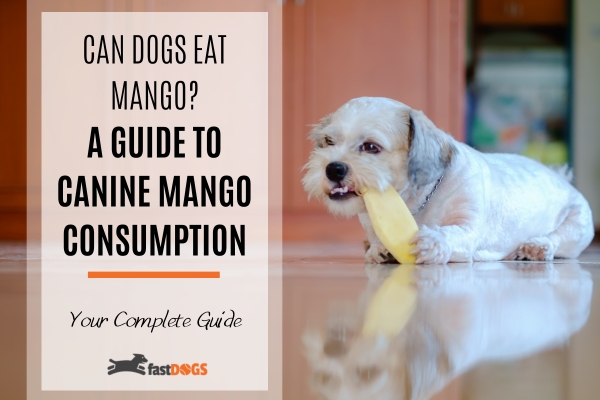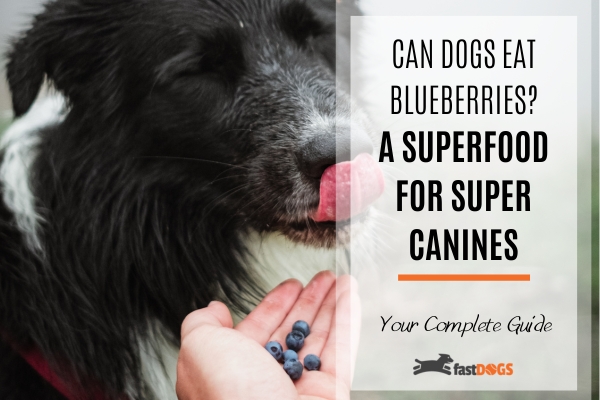Can Dogs Eat Coconut? Coco-Yes or Coco-NOT?
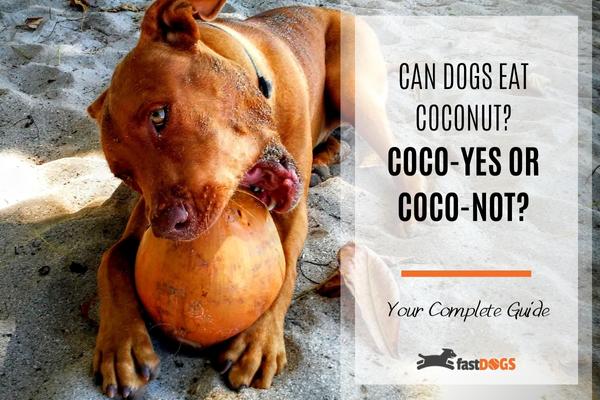
Can Dogs Eat Coconut? Barking up the Coconut Tree!
Coconuts are a tropical fruit enjoyed by many of us pet owners, and they offer numerous health benefits to humans too. But does the same apply to our furry friends? Can dogs eat coconut?
Let’s find out…
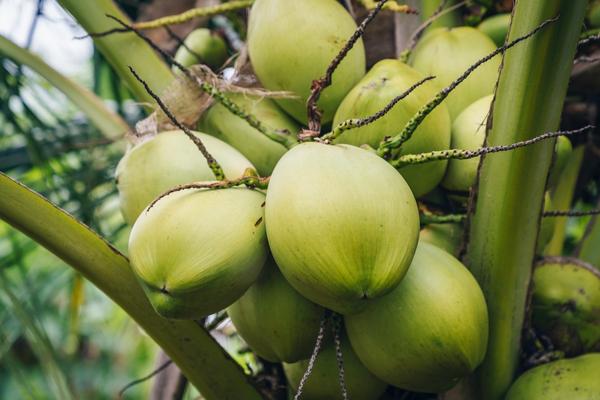
Can Dogs Have Coconut?
Although not typically native to the US, coconut is found on supermarket shelves in many different forms — it’s even found in some commercially produced dog foods.
So, if it’s listed on the ingredients of many popular dog foods, coconut must be safe to feed your pup, right?
Indeed it is.
Coconut can even be good for your canine companion. However, like other treats, it should only be fed to dogs within limits.
How Is Coconut Good for Dogs?
Although dogs don’t need to eat coconut as part of a well-balanced diet, your pooch will probably love the taste of it. Just as this tropical fruit is known to offer many health benefits for us, feeding your pooch coconut can offer them the same pluses.
Reduces inflammation — Coconut oil and meat are natural anti-inflammatories. They can speed up healing and soothe cuts, hot spots, and other wounds. Coconut meat can also help to relieve the aching joints caused by arthritis.
Enhances the immune system and fights disease — Coconut is high in lauric acid, an MCT that’s antifungal, anti-bacterial, anti-viral, and anti-parasitic. It can fight off yeast infections, ringworm, giardia, and viruses such as canine influenza.
Rich in antioxidants — The phenolic compounds found in coconut flesh are high in antioxidants. These further help defend your pooch’s body from bacteria, parasites, and fungi, and can help to repair damaged cells.
Good for the skin and coat — Fatty acids found in coconut can help support a healthy coat while antioxidants can relieve dry or itchy skin. Although you can add coconut oil to your dog’s food, it can also be used externally as a topical moisturizer for improving your dog’s skin and coat.
Supports bone health — Coconuts contain manganese that’s integral to bone health and boosts metabolism.
Rich in vitamins — Folic acid, vitamin B and E, and biotin can all support doggy health.
How Is Coconut Harmful to Dogs?
It’s not all good news though — here’s why:
High in Calories and Saturated Fats
Coconuts are relatively heavy on calories, which can lead to an increase in weight, and, subsequently, other weight-related health issues. Plus, those health-boosting MCTs may also trigger gastrointestinal upset in your pooch and even increase the risk of pancreatitis, a serious condition.
Just like other fruits, such as mango, bananas, strawberries, or pineapples, the sugar content of coconuts can be something to watch for. If you want to see a complete list of dog-friendly fruits, take a look through our guide on What Fruits Can Dogs Eat?
Can Dogs Eat Coconut Shell?
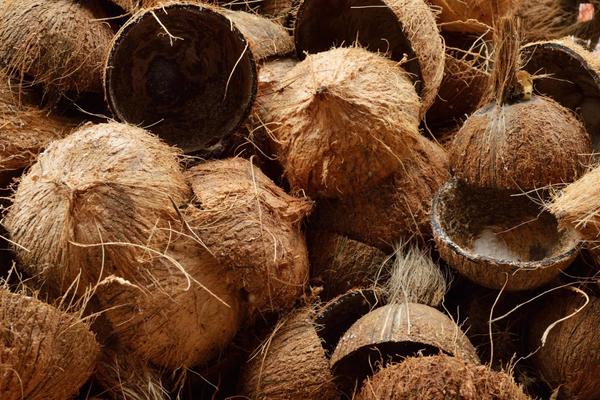
While what’s on the inside may be fine for your dog, the outer hard shell and husk are another matter.
Both can present a choking hazard or cause an intestinal blockage. So, you should remove any traces of shell from the flesh before feeding to your pooch. Even the smallest sliver will be tricky to digest. It may even be sharp enough to cause internal damage to their GI tract.
Store-Bought Products
Care should also be taken if feeding your pooch pre-packaged coconut products. For example, coconut flakes, pre-made coconut milk, or coconut-baked foodstuffs.
Often store-bought coconut products, even coconut water may contain added ingredients, like sugar or salt, which can be harmful to your little pooch. What’s more, they could contain substances like xylitol, a sugar alternative that’s very toxic for canines.
Can Puppies Eat Coconut?

In most cases, human ‘treat’ foods should be avoided until their digestive system fully develops. In the early stages, a puppy’s GI tract may be more sensitive and more easily irritated by high levels of saturated fat. Puppies are more likely to experience bloating, gassiness, and stomach upset if they consume too many treats.
Plus, as a puppy’s metabolism may not be fully up to speed, the extra calories from coconut can result in early weight gain. This can cause problems later in adulthood, including obesity, diabetes, and potential pancreatic problems.
When Is Coconut OK for Dogs?
With so many different forms of coconut available, it’s hard to know which you can feed your pup. Let’s try to answer a few of those questions:
Can Dogs Eat Fresh Coconut?
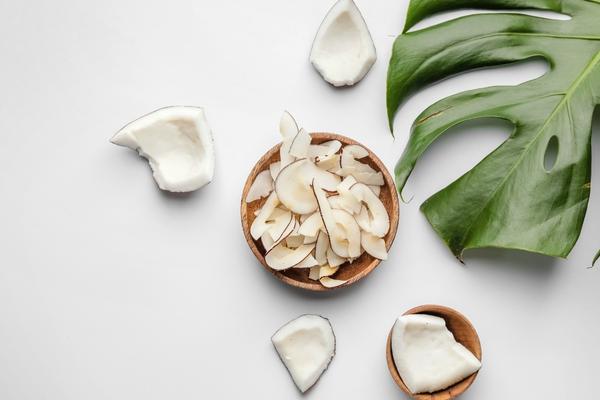
Fresh coconut is probably the safest way of feeding your pooch coconut — as long as you’ve prepared it yourself. Coconut meat cut straight from the shell and then shredded into small flakes is free of any other additives and rich in micronutrients.
When asking, can dogs eat raw coconut? — be sensible about it. Coconut should always be regarded as a treat, only adding a few small flakes to the top of their regular food. Larger flakes may cause choking in your pup, and as the coconut meat is fat and fiber-laden, it can lead to stomach upsets and diarrhea if eaten in excess.Can Dogs Have Coconut Milk?

Unsweetened coconut milk is safe for your pooch, providing it’s offered sparingly and comes out of their treat allowance. As in, a teaspoon per meal.
Ice cream made with natural coconut is also safe for dogs — although check for other additives such as sugar and xylitol. If non-dairy, it can be a good alternative for lactose-intolerant pooches.
Can Dogs Eat Coconut Oil?
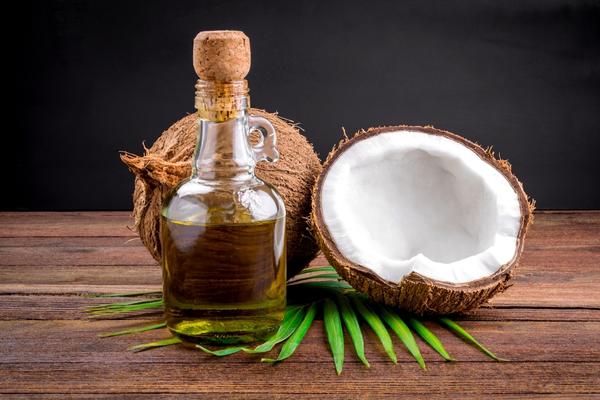
Coconut oil may be trending for us humans as the healthy fat choice, but is coconut oil good for dogs to eat?
Although it's not poisonous to dogs, it doesn’t meet the dietary fat requirements of a dog’s diet. Lacking in omegas 3 and 6, it should only be used as a supplement to your pup’s healthy diet rather than a fat replacement.
With only a teaspoon of coconut oil a day recommended for consumption by most dogs — due to the high-fat content — the oil’s benefits to the skin and coat of your pup can also be administered externally.
Many doggy shampoos and moisturizers contain coconut oil. As an active ingredient, the oil can be used to treat conditions like dry or cracked paws and soothe other cuts or wounds when applied topically.
Can Dogs Eat Dried Coconut?
To be dog-friendly, dried coconut should be unsweetened and without additives or preservatives.
If in larger pieces, chop the coconut into smaller chunks, it will be easier for your pup to chew. Before serving, briefly heat the pieces in a pot of boiling water. This also makes the coconut easier for your dog to digest without upsetting their stomach. And, to avoid any digestive stress or diarrhea — don’t offer in excess.
How Much Coconut Can My Dog Eat?
Moderation is key. And, as with other fruits dogs can eat, coconut should be deemed part of their treat allowance of 10 percent of their daily calorie intake. The remaining 90 percent should come from a well-balanced diet of traditional doggy foods.
Extra small dogs — under 20 pounds — stick to no more than one-eighth of a teaspoon a day.
Small to medium-sized pups — 21 to 50 pounds — this can be increased to half a teaspoon of coconut meat/flesh per day.
Large/extra large dogs — 51 pounds to 90 pounds and over — should still be limited to just one, to one and a half teaspoons a day to avoid gastric distress and consuming too much fat.
Final Thoughts
In short, for sure, dogs can enjoy coconut in all its varied forms — but only in moderation, and it should be treated as, well, a treat! Coconut is a tasty exotic snack that can offer your pooch a whole range of health benefits from good-for-you fatty acids, vitamins, fiber, protein, and essential minerals.
Next time you’re enjoying a coconut-based treat with the family and wonder can dogs eat coconut, the answer is more likely: why wouldn’t a dog eat coconut? Not only will their bodies be smiling on the inside, but you’ll even notice the difference in their shiny coat too.
Can Dogs Eat Coconut? FAQs
Can Dogs Have Coconut Water?
Yes, they can. Coconut water is packed with vitamins, minerals, and enzymes that can help replenish your canine’s body.
However, it should never be their main source of water. The levels of potassium can cause problems if your pup consumes too much. It could lead to health issues such as hyperkalemia.
Plus, store-bought coconut water must be free from added flavorings or sweeteners, such as xylitol, which are not safe for dogs.
Can Coconut Shell Be Used as Dental Treat for Dogs?
While a coconut shell sounds like an ideal non-toxic alternative for a dental chew, you should avoid it. If a piece breaks off it could be a choking hazard. Plus, it’s pretty difficult to digest, so not only could it cause a blockage, but the sharper brittle edges could damage your dog’s stomach, throat, and GI tract.
Can Dogs Eat Coconut Flour?
If your pooch suffers from gluten intolerance, coconut flour is an ideal alternative to traditional wheat-based flour if you want to bake some doggy treats. However, remember coconut has a high fiber content, so allowing your dog to overindulge can lead to digestive problems and potential diarrhea.
Are Some Dogs Allergic to Coconut?
Although very rare, just like with any other food, some pooches may be allergic to coconut. Signs include:
Persistent Itching.
Redness of the skin.
Swelling.
Hair loss.
Decrease in energy levels.
Diarrhea.
Vomiting.
If in doubt, check with your vet before continuing to feed your pup any coconut.
What Other Fruits Are Safe to Give Your Dog?
Fruit makes a healthy treat you can reward your pooch with when training or as part of their balanced diet. You can feed your dog the following:
Apples.
Cantaloupe.
Cranberries.
Oranges.
Raspberries
Strawberries.
Fruits you should avoid and can even be toxic to your pup include:
Avocado.
Cherries.
Grapes.
Passionfruit.
What Nuts Can Dogs Eat?
Coco-NUT is not strictly a nut (it’s a single-stoned fruit, like apricots, peaches and nectarines). Yet, nuts can also make healthy treats for your pooch when fed in moderation. Some varieties you can safely feed your canine companion include:
Peanuts.
Cashews.
Chestnuts.
However, others like almonds, pecans, and macadamia should be avoided. To learn which nuts are dog-friendly and which aren’t, check out our guide on can dogs eat nuts?

